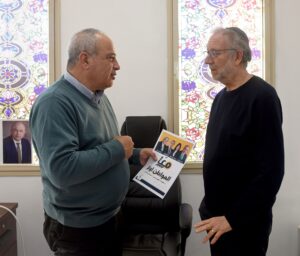Israeli Scene
Finding a Political Path Together as Fellow Israelis

Mohammed Dawarshe has something to say about what he dismisses as “old-school coexistence.”
“It’s that coexistence where we meet for a plate of hummus and we avoid the issues and we talk about how nice human beings we are,” said Dawarshe, director of planning, equality and shared society at Givat Haviva, the Center for Shared Society. “And we sing the hora and we do what we call ‘cultural sharing.’ This is nice for the moment. It expires the day after. It means nothing. It doesn’t change reality.”
Sitting next to Dawarshe in his sun-drenched home office in the village of Iksal, near Nazareth, and nodding in agreement is Yossi Klein Halevi, author of the 2018 best seller Letters to My Palestinian Neighbor.
Dawarshe, the scion of a Muslim family that has lived in the Galilean hills for 800 years, and Klein Halevi, the son of a Holocaust survivor who is a religious, bearded, kippah-wearing Jew who immigrated to Israel from New York in 1982, might appear an unlikely fit for old friends. But the two, fellows at the Shalom Hartman Institute who revel in their deep debates about Israeli identity and the country’s future, have been in an ongoing dialogue for years.
Klein Halevi traveled to Iksal to hear more about the new Arab political party formed by Dawarshe ahead of the most recent Israeli elections, held on March 23. Called Maan, Arabic for “together,” it is the first-ever centrist party led by Arab citizens, and it seeks to partner with centrist Jewish voters and parties. Shortly before election day, when it became clear it would not get enough votes to enter the Knesset, Maan withdrew from the race and put its support behind the Arab-led Joint List.
“What Mohammed is really saying to me, as a fellow Israeli, is ‘What does Israeliness mean?’ ” said Klein Halevi. “How do we expand Israeliness? And I think that, for me, is the essence of Mohammed’s challenge. Challenging the Arab community to stop the pretense. Israel is a Jewish state. We live in a Jewish state; it’s time after 70 years to accept it. But Mohammed is also turning to the Jewish majority and saying, ‘Do you accept Israel as a democratic state? I’m ready to accept Israel as a Jewish state, on one condition. You have to accept this Israel as a democratic state.’ ” And in a democratic state, all citizens have equal rights.
To be a fly on the wall and hear more of Dawarshe and Klein Halevi’s conversation, listen to “The Israelis,” Season 2, Episode 9 of The Branch podcast, a project of the Education and Advocacy Division of Hadassah. Another must-download is “Crime Busters” (Season 2, Episode 8), in which listeners meet two women—one Jewish, one Arab, both mothers in their late-30s—trying to fight the crime wave engulfing Arab towns and cities in Israel.









 Facebook
Facebook Instagram
Instagram Twitter
Twitter
Leave a Reply